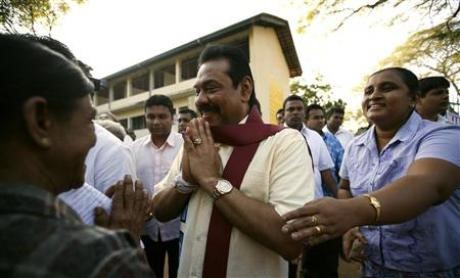 Two former allies who led Sri Lanka to victory in a 25-year civil war dueled at the ballot box on Tuesday after a bitter, personal campaign for the country’s first peacetime presidential vote in nearly three decades.
Two former allies who led Sri Lanka to victory in a 25-year civil war dueled at the ballot box on Tuesday after a bitter, personal campaign for the country’s first peacetime presidential vote in nearly three decades.
More than 14 million people registered to vote, and polling began amid heavy security and fears that election day would be as bloody as a campaign in which five people were killed and more than 800 violent incidents were recorded.
President Mahinda Rajapaksa and General Sarath Fonseka are the rivals in a close contest in which the defeat of the Liberation Tigers of Tamil Eelam (LTTE) in May has figured heavily in campaigning, with both claiming credit.
Rajapaksa as commander-in-chief and Fonseka as the army commander stood side-by-side after the historic victory in May, but within months split over what the general said was his sidelining by the president and false coup plot accusations.
Despite the sound of blasts before polling in the northern city of Jaffna, the cultural center of Sri Lanka’s Tamil ethnic minority, and a petrol bomb attack, polling was smooth, election observers said. No one was wounded in those attacks.
Human Rights Minister Mahinda Samarasinghe blamed the opposition for setting off the blasts.
"We were alerted yesterday to the plan of the opposition to create this kind of situation, so they could tell the international community the government was doing this to intimidate the people in Jaffna," he told Reuters.
A motley coalition of opposition parties with divergent ideologies have united to support Fonseka with the sole aim of beating the incumbent, who called the vote two years early hoping to capitalize on his seemingly insuperable post-war popularity.
Whoever wins will take the reins of a $40 billion economy still awaiting the full peace dividend, despite large Indian and Chinese investments into infrastructure and about $1.5 billion in foreign investment into government securities.
Major investors have shied away, saying Sri Lanka first have must rein in government spending, which would in turn boost confidence in the rupee currency.
The Colombo Stock Exchange, open for a half-day trading session, rose nearly 1 percent by 0600 GMT (1 a.m. EST). It was one of the world’s best performing markets last year, gaining 125 percent after the war and is at record levels this year.
The rupee has been mainly stable in the last year, but fell as much as 6 percent in April and May as cash reserves plunged.
HIGH COST OF LIVING
More than 68,000 police and a quarter-million election officials have spread out across the Indian Ocean island, which for the first time in nearly three decades votes without the fear of suicide blasts or attacks by the Tamil Tiger separatists.
"Today’s victory will be remarkable. It’s been evident with voters across the nation participating toward our victory," Rajapaksa said after voting in Medamulana, his rural district on the southern coast. "We expect a peaceful election and are getting ready to enjoy a better tomorrow."
Both Rajapaksa and Fonseka have pledged to dole out costly subsidies and public sector pay rises, which economists say will make it hard for Sri Lanka to meet its cost-cutting obligations under a $2.6 billion International Monetary Fund loan.
"What I expect in the future is that in the same way peace was established, the cost of living will be brought down and the unemployment problem will be solved, 51-year-old security guard Jayantha Perera told Reuters TV before casting his vote.
Since the main contenders are expected to split the Sinhalese ethnic majority’s vote bloc, about 75 percent of the nation’s 21 million people, the remaining minority vote could become decisive if the Sinhalese division is even.
(For updates you can share with your friends, follow TNN on Facebook and Twitter )
